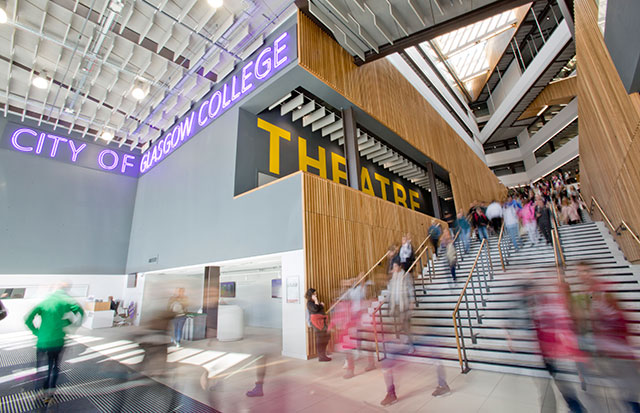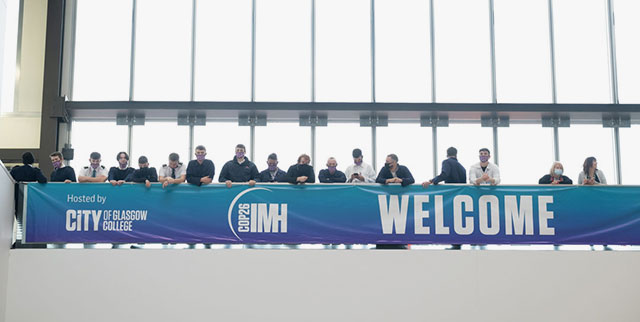As part of its commitment to innovation City of Glasgow College invited EFQM to review its operations. EFQM is an internationally recognised quality standard and recently seven international assessors visited the College to review progress and undertake a rigorous audit.
The global assessors took part in over 30 meetings with more than 200 staff from across the College and were impressed with what they found. When the analysis and deliberation was completed, City of Glasgow College were recognised for ‘Outstanding Achievement for Driving Innovation’. They also achieved a 7 Diamonds ranking putting the college in the company of organisations such as BMW Group and BOSCH GmbH who have been similarly awarded by the EFQM. This makes it the best rating for any educational institution in EFQM’s 30-year history. It was clear a focus on innovation was key to achieving this result.
EFQM Chief Executive Officer, Russell Longmuir commented: “The EFQM Assessment team and jury were greatly impressed by the leadership team in City of Glasgow College, and their relentless focus on innovating and adapting to change while keeping their attention firmly on the needs and welfare of the student body.”
“Our college has long recognised the importance of innovative thinking. We see it as key in taking the college forward, and it’s playing an increasingly important role in education."
Stuart McDowall, Head of Innovation and STEM at City of Glasgow College
What does innovation mean to your organisation?
City of Glasgow College has a history of doing things differently. Since its inception in 2010 innovation has been one of its guiding principles. As host for the Scottish Institute of Innovation and Knowledge Exchange (Scottish IKE), City of Glasgow College delivers training to help business benefit from research and innovation interventions. The college is also an Investor in Innovations ISO56002 Standard organisation; one of only a handful of educational institutions to have secured this innovation-specific standard.
As part of an international network, Scottish IKE has generated over one million pounds of new investment for business, creating a unique collaboration of industry, academia and business.
“Innovation is critical to the functioning of society,” says Stuart McDowall, Head of Innovation and STEM at City of Glasgow College.
“The organisations which understand that are the ones most likely to succeed. Our college has long recognised the importance of innovative thinking. We see it as key in taking the college forward, and it’s playing an increasingly important role in education.”
What are your challenges and focus for 2023?
The college continues to innovate in the delivery of education. After two years of restrictions, welcoming back - and re-integrating - 30,000 students and over a thousand staff to our twin super-campus remains a major focus. As we do so, we are ensuring we embed the lessons of the pandemic, delivering the best balance of digital delivery, hybrid working and tailoring for our learning and industry partners.

What have been the major highlights and challenges encountered on your journey and ambition to be recognised as an innovative organisation?
Over the last decade, City of Glasgow College, has emerged as a next generation ‘super-college’, driving civic and economic renewal within the Glasgow region and across Scotland. The College now supports 8000 skilled graduates a year across a twin-site campus that represents a £228 million investment in Glasgow. As well as engaging with some of the UK’s most deprived communities, the College is now highly active on the international stage, with partners in some 26 countries, and 4,000 international students.

On its journey, the College has worked to reshape tertiary education in Scotland, winning the Herald Higher Education Awards, Research Project of the year for its innovative work on the risks of oxygen depletion in shipping containers, saving lives in the maritime sector; we have additionally delivered over 25 innovation projects worth in excess of £1.4 million – in doing so, becoming the first organisation in the UK to achieve Investor in Innovations status.
We have additionally delivered over 25 innovation projects worth in excess of £1.4 million – in doing so, becoming the first organisation in the UK to achieve Investor in Innovations status.
To get here we have had to address the twin challenges of disparity of funding; and a highly competitive market for Higher Education. That said, as the largest college in Scotland we take our leadership responsibilities seriously. Having hosted the International Maritime Centre’s ‘hub’ venue at the UN’s climate change event - COP26 - the College is now supporting a net-zero carbon-based recovery, with plans for a £24M Innovation & STEM Centre. Together, our activity leads to a £2bn boost to Scotland’s long-term public sector revenues.

What is the one thing other organisations can learn from you?
Our appetite for innovation; and our work demonstrating how colleges can create economic value through a market-focused approach to applied research, innovation projects and targeted support for small business.
What are the benefits that your organisation has enjoyed from using the EFQM Model?
The framework provides a tried and tested basis to assess our progress.
In this assessment year, EFQM has supported strategic and operational calibration, using its international expertise to act as a highly respected critical friend telling us not only where we are doing well but where we have the potential to grow and improve.
EFQM acts as a highly respected critical friend telling us not only where we are doing well but where we have the potential to grow and improve.